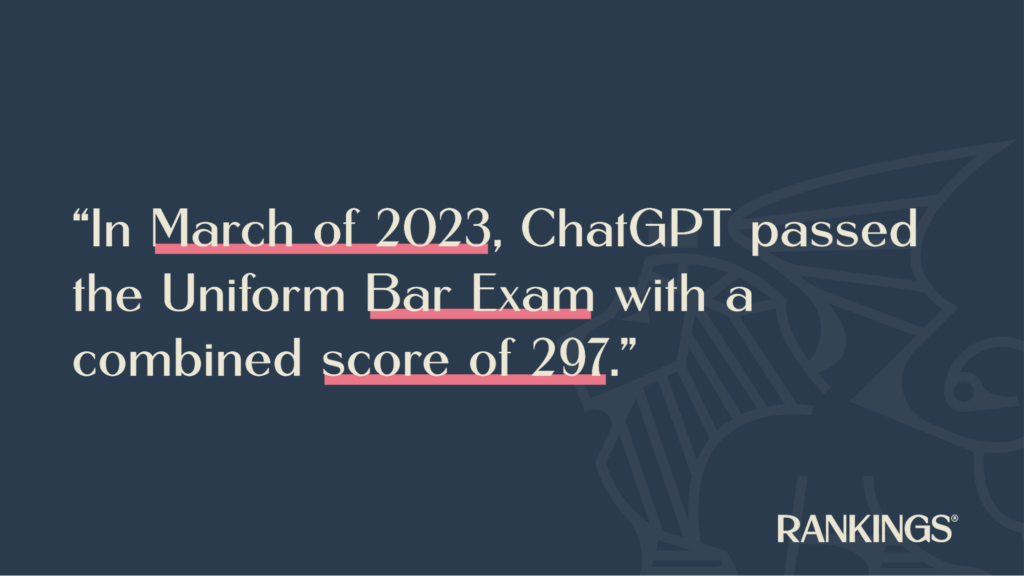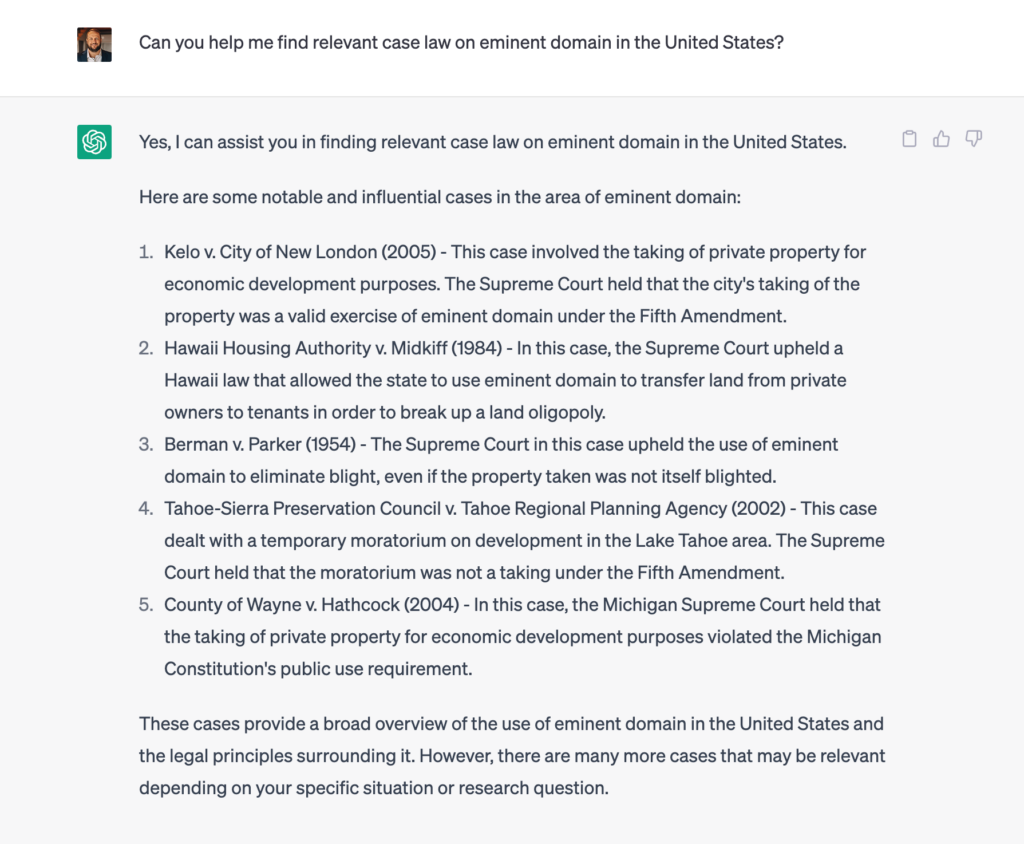The legal profession has often been slow to embrace new technology, but ChatGPT is an innovation that lawyers can’t afford to ignore.
ChatGPT offers new possibilities for modernizing law firms and raises questions about the future roles of attorneys. While some may view ChatGPT as a threat, forward-thinking lawyers see it as an opportunity to transform their work.
Embracing this cutting-edge technology may hold the key to a more productive, profitable, and client-centric law firm.
What is ChatGPT?

If you’ve followed the news since late 2022, you’ve probably heard of ChatGPT.
ChatGPT is a large language model developed by OpenAI. It uses machine learning algorithms to analyze text and generate responses to natural language prompts. The model can understand and process human language and then respond to it.
To be less technical, it’s an advanced AI chatbot.
You give it a prompt, such as a question, and it responds with an answer that seems human. But that description doesn’t do full justice to the tool. The possibilities that ChatGPT represents for businesses, including law firms, are numerous.
Since its release in November of 2022, ChatGPT has become a cultural phenomenon.
It’s been a major topic in the media, and in February of 2023, it became the fastest-growing consumer application in history, with over 100 million monthly users. It took Facebook almost 5 years to hit the same number.
People have used ChatGPT to code entire websites, create fully-functional applications, explain concept concepts, and automate tedious business tasks. And that only scratches the surface of what it can do.
In March of 2023, ChatGPT passed the Uniform Bar Exam with a combined score of 297.
Although the tool is still in its infancy, it’s natural for lawyers to question the future of their roles. As ChatGPT continues to develop, it can serve as a valuable resource to enhance their practice and enable them to stay ahead in a competitive market.
Will this Technology Replace Me?
ChatGPT is less likely to replace the need for lawyers than it is to help lawyers become more productive. AI chatbots will transform the way work is done, including work in law firms. Just like the personal computer brought changes, ChatGPT will also cause shifts.
The key is learning how to use it correctly.
Learning to use this tool as an early adopter can give lawyers a leg up over their competition. Integrating ChatGPT in your law firm has both productivity and profitability implications. It also has the potential to improve the lives of the people you serve.
In terms of productivity for lawyers, ChatGPT can be a huge help.
It can do simple things like speeding up the time to respond to client emails. It can do more complex tasks, like helping you put together the first draft of a PI demand letter. With its help, you can analyze and summarize legal research that would otherwise take hours.
With this bump in productivity, you’re on track to improving your law firm’s profitability.
Because you can get more done with the help of AI, you can free up more time to help clients. You’ll also have more time to spend on high-value tasks than on lower-value administrative work.
By serving more people more efficiently, you may improve client satisfaction. This could lead to an increase in referrals and help grow your law firm even more.
Use Cases for ChatGPT in a Law Firm
ChatGPT is poised to revolutionize the legal field with its ability to enhance processes within law firms. Here are just a few ways it can streamline workflows, boost efficiency, and offer valuable insights for attorneys.
Legal Document Drafting
Since it is a natural language text generator, ChatGPT excels at creating long-form documents. What’s more, it’s great at developing documents that follow a highly-structured format. This means that ChatGPT has the potential to streamline your process of drafting formal legal documents.
You can use ChatGPT to help you develop your first drafts for things like demand letters, non-disclosure agreements, and even contracts.
For example, here’s a video from Simon Gibson showcasing how he got the tool to write an NDA.
If you watch the full video, you can also find his process for creating a contract, a demand letter, and other documents.
While he deals with UK and Australian law in this video, you can apply these principles to US law. All it takes is a well-crafted prompt to push the AI in the right direction, and you’ll have a first draft. From there, you can modify the draft yourself or work with the AI to refine it.
Note that you should treat the documents ChatGPT returns to you as a first draft.
The language model can make mistakes and give you a document that is not 100% correct. An expert should review and edit the AI draft before it leaves your office. But doing that is often faster than staring at a blank page and typing a draft from scratch.
Analyzing and Summarizing Documents
ChatGPT doesn’t just generate text. It can understand the data you give it and extract the key points. This makes it an excellent candidate for summarizing lengthy documents like briefs, discovery files, deposition transcripts, and more.
Getting a summary from ChatGPT isn’t hard. You just need to prompt the AI with something like “Summarize this document:” and then paste your document into the chat.
You can also ask it to provide a specific type of summary.
For instance, you could ask it to respond with the summary in a set amount of bullet points so that it’s easy to digest. Or you could tell it to write a summary that is no longer than a certain number of words.
You can also ask ChatGPT to analyze a document.
For instance, you could ask it to find logical fallacies in a brief that you wrote. Or you could ask it to look for and fix grammar mistakes. Or you could give it a complex email and ask it to break it down into action items.
The biggest limiting factor with summaries and analysis using ChatGPT is the token limit.
The token limit is the maximum number of words or characters that ChatGPT can process in a single input. If your document exceeds the token limit, ChatGPT can only summarize up to that limit.
On the free ChatGPT plan, the limit is 4096 tokens. GPT4, which is only available on the paid ChatGPT Plus plan, has a token limit of 8192.
Each token corresponds to approximately 4 text characters. If you’re ever concerned with token length, OpenAI has a free tokenizer tool to measure how many tokens long a given piece of text is.
Assisting with Legal Research
ChatGPT may also be helpful for lawyers while they are researching.
Since OpenAI trained ChatGPT on a large body of public data, it can find things like case law, court opinions, and precedents. The tool may also be helpful with cross-referencing and analyzing this legal research.

There’s one big limitation to using ChatGPT for legal research for now.
The tool does not have access to the internet right now. It can’t find recent case data or anything after 2021. OpenAI is working on a browser plugin allowing people on paid plans to ask ChatGPT to search the web.
Because of this, it may not be able to find all the legal research you may need.
Transcribing Voice Notes, Videos, and More
Transcribing notes from an audio or video file may not seem like a big deal, but this may be the most impactful use case we’ve looked at so far.
Imagine pulling out your phone and recording yourself talking through an ongoing legal matter. Then a few minutes later having a complete transcript of the recording along with a bullet list summary, action items, and follow-up questions.
In the video below, productivity expert Thomas Frank walks viewers through the process of creating a transcription system. This video is a little long, but it’s worth bookmarking.
The best part is that you don’t have to limit yourself to your own voice notes.
With a little modification, you can use any audio file. That means rich transcripts of things like depositions, firm meetings, and even podcasts you’re listening to for personal development are all within reach.
Responding to Emails
Dealing with email can be a huge drain on a lawyer’s time. ChatGPT can help with that.
Using some of the processes mentioned above, you can paste an email into ChatGPT. Then you can ask it to summarize it for you. From there, you can prompt the tool to help you draft a response to that email.
Once you’ve created a prompt that works for you, you may see your time spent responding to emails shrink.
That’s only one way to use ChatGPT to help with your email, though. You can also use third-party tools to make the process even easier. In the video below, attorney Enrico Shaefer walks his viewers through his process for responding to emails with ChatGPT.
This is just a selection of the possibilities for lawyers with ChatGPT. As this tool develops and evolves, more functionality will emerge.
For now, you can take these ideas and pair them with some key considerations to get the best results.
Getting the Best Results from ChatGPT
Before jumping headfirst into using ChatGPT, there are some limitations you should know.
ChatGPT is not perfect. The data that it gives you will not always be 100% accurate. When you use it, take what it tells you with a grain of salt and fact-check it. AI language models have a tendency to “hallucinate” or make things up.
That’s one of the reasons why human guidance is key to using AI tools.
When you create your prompts, you can limit the possible outcomes by not asking open-ended questions. You can also give it more context on the task you are asking it to perform. That way, the tool will give you results that are closer to your expectations. Over time, you’ll refine your prompts so that you’ll consistently get outputs that you like.
Transform Your Law Firm with ChatGPT
ChatGPT offers a unique opportunity for lawyers to modernize their practices and outpace competitors. By incorporating ChatGPT into everyday tasks, attorneys can boost productivity, profitability, and client satisfaction.
While ChatGPT has limitations, early adopters who embrace its potential can significantly enhance their legal practice.
To learn more about how AI can help lawyers, check out our guide to the topic here.
The post ChatGPT for Lawyers: Embracing AI to Enhance Your Legal Practice appeared first on Rankings.




